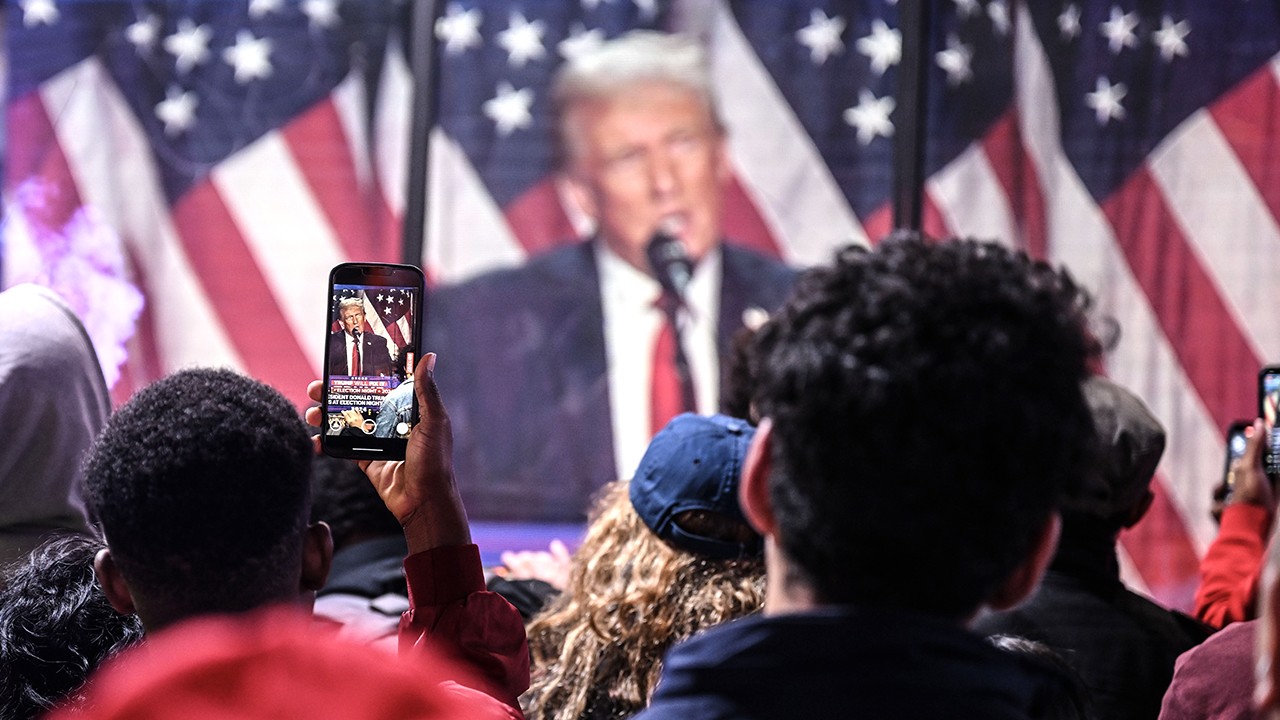With Donald Trump’s decisive victory in the recent presidential election, discussions are intensifying about the motivations and beliefs of his voter base. To understand the forces behind his continued political influence, it’s essential to delve into the perspectives of those who propelled him to victory. Based on pre-election surveys conducted by the Pew Research Center throughout the past year, we gain valuable insights into why people vote for Trump and what matters most to his supporters.
Trump: The Agent of Change
A dominant theme among Trump’s supporters is the perception of him as a catalyst for change. A significant majority (86%) of his backers, as revealed in an October survey, believed that Trump would bring positive change to Washington. This sentiment contrasts sharply with views on his political opponents, highlighting a core reason why people vote for Trump: the desire for a political shake-up. Conversely, only a small fraction of Trump’s own supporters (12%) anticipated minimal change under his leadership. This expectation of transformative change, whether perceived as positive or negative, was a defining characteristic of opinions surrounding Trump’s candidacy.
Key Issues Driving Trump Support: Economy and Immigration
Similar to the 2020 election cycle, economic concerns remained paramount for those who vote for Trump. A September poll indicated that an overwhelming 93% of Trump voters considered the economy to be a “very important” issue influencing their vote. This underscores the persistent significance of economic anxieties in driving political choices for a large segment of the electorate.
Immigration emerged as the second most critical issue for Trump’s voter base, with 82% rating it as “very important.” Notably, this represents a substantial surge in importance compared to 2020, when 61% of Trump supporters prioritized immigration. This increase suggests a growing emphasis on immigration-related issues as a motivator for those who vote for Trump.
In contrast, issues such as climate change (deemed very important by only 11%), racial and ethnic inequality (18%), and abortion (35%) were considerably less central to the voting decisions of Trump supporters. This disparity in issue prioritization provides a clearer picture of the specific concerns that mobilize Trump’s base.
Cultural Alignment: Core Beliefs of Trump Voters
Polling data collected throughout the year reveals a strong consensus among Trump supporters on several key cultural issues. These shared beliefs are crucial in understanding the broader ideological framework that resonates with those who vote for Trump:
- Biological Sex: An overwhelming 92% of Trump supporters affirmed the belief that biological sex is immutable, rejecting the notion of gender identity differing from sex assigned at birth.
- Gun Ownership: A large majority (89%) believed that gun ownership enhances rather than diminishes public safety, reflecting a strong stance on Second Amendment rights.
- Criminal Justice: 83% perceived the criminal justice system as insufficiently tough on criminals, indicating a desire for stricter law enforcement and penal measures.
- Legacy of Slavery: A significant 75% downplayed or dismissed the ongoing impact of slavery on the current position of Black people in American society.
These positions on cultural issues highlight a distinct ideological profile that characterizes a significant portion of those who vote for Trump.
Interestingly, on issues that might challenge conventional assumptions, the surveys revealed:
- Gender Equality: A majority (71%) of Trump supporters did not believe that women’s societal gains have come at the expense of men.
- Religion and Government: Slightly over half (55%) advocated for maintaining a separation between religion and government policies, although this figure is significantly lower than among supporters of opposing political viewpoints.
Desire for Smaller Government, but Hands Off Social Security
The traditional Republican emphasis on limited government resonated strongly with Trump’s base. A substantial 72% of Trump supporters expressed the view that aid to the poor causes more harm than good, aligning with a philosophy of reduced government intervention in social welfare.
However, this desire for smaller government had a notable exception: Social Security. Overwhelming majorities of both Trump supporters (77%) and their political opponents (83%) opposed any reductions in Social Security benefits. This widespread bipartisan agreement underscores the political sensitivity of entitlement programs, even among those who generally favor reduced government spending.
Negative Outlook on National Conditions
A defining characteristic of Trump supporters’ views was their pronounced negativity regarding the state of the nation. In the lead-up to the election, a mere 5% of Trump supporters expressed satisfaction with the direction of the country. Furthermore, a significant 89% voiced strong concern about rising prices for food and essential goods, reflecting widespread economic unease.
This pervasive dissatisfaction, while also present among opposing voters (though to a lesser extent), highlights a key element in understanding why people vote for Trump: a sense of national decline and discontent with the status quo.
Perceived Clarity of Trump’s Policy Positions
Crucially, Trump’s supporters felt well-informed about his policy stances. An impressive 94% of Trump voters believed he had clearly articulated his plans for addressing illegal immigration. Similarly, large majorities felt informed about his economic and foreign policy agendas. Healthcare was the only area where a smaller, though still substantial, majority (58%) felt they understood Trump’s policy approach.
This perception of clarity, particularly on key issues like immigration, likely played a significant role in solidifying support for Trump, as voters felt they knew what to expect from his leadership.
Acceptable and Unacceptable Actions for Trump
When considering potential presidential actions, Trump supporters drew a line between what they deemed acceptable and unacceptable. A majority (58%) found it acceptable for Trump to utilize executive orders to bypass congressional gridlock and enact policies. A similar percentage (54%) considered it acceptable for him to direct federal law enforcement to investigate political rivals.
However, significant pushback emerged against actions perceived as overly authoritarian or self-serving:
- Firing Government Workers: 58% deemed it unacceptable for Trump to dismiss government employees based on loyalty.
- Pardoning Allies: 57% viewed it as unacceptable for Trump to pardon convicted friends or supporters.
These distinctions reveal a nuanced perspective among Trump supporters, indicating support for assertive leadership within certain boundaries of democratic norms.
A Call for Unity? Addressing All Americans
Despite strong partisan divisions, a notable sentiment for unity emerged among Trump’s base. A significant 86% of Trump supporters believed he should prioritize addressing the concerns of all Americans, even if it meant disappointing some of his own backers. This suggests an underlying desire for broader national reconciliation, even within a deeply polarized political landscape.
Furthermore, 70% of Trump supporters expressed the view that the next president should strive to collaborate with the opposing party in Congress. A similar percentage anticipated that Trump would indeed work across the aisle if elected, although only a smaller fraction (19%) considered it “very likely.”
Conclusion: Decoding the Trump Vote
Understanding why people vote for Trump requires a multifaceted approach, considering economic anxieties, cultural values, and perceptions of political change. Trump’s appeal rests on a combination of factors, including his image as an outsider, his focus on issues like immigration and the economy, and his alignment with specific cultural beliefs. While his supporters express strong opinions on a range of issues, they also reveal nuances and even a desire for unity that can be crucial for navigating the path forward in a divided nation.

